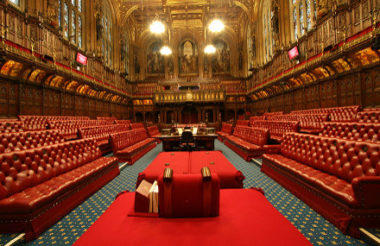Peers have questioned whether lessons are being learned to make government citizenship and volunteering programmes more effective, in the opening evidence session of a new committee.
Members of the House of Lords Committee on Citizenship and Civic Engagement took evidence yesterday from four senior civil servants responsible for government programmes:
- Hardip Begol, director of the integration and faith division at the Department for Communities and Local Government
- Paul Morrison, director of resettlement, asylum support and integration at the Home Office
- David Rossington, director of the Office for Civil Society at the Department for Digital, Culture, Media and Sport
- Ann Gross, director special needs, disadvantage and character policy at the Department for Education.
Labour peer Lord Blunkett said the committee wanted to know if there are "lessons of what actually works" and that there was concern that "we keep reinventing the wheel".
Lord Hodgson, Conservative peer and chair of the committee, asked the four how closely they worked together and who "has explicit leadership responsibilities for ensuring that this programme is effectively dealt with".
Begol said that no department and overall responsibility because it is a "broad" area and “given the cross-cutting nature of this I don’t think there would be a natural lead”.
But he said he had “met David [Rossington] three times in my first month”.
Rossington added that the OCS arranges regular meetings across government "for all those interested in voluntary sector or have dealings with the voluntary sector” and that “citizenship is a wide-ranging subject so it is not confined to a particular department”.
He highlighted the OCS community organiser programme and its work with Nesta on older people's volunteering as examples of support.
Rossington also said that the #iwill campaign, led by Step Up to Serve, helped to reach people "Early in a person’s life get them thinking about and engaging in social action”.
He said the aim was to increase volunteering by those aged 10 to 20 from the current level of 40 per cent to 60 per cent by the end of the Parliament.
Questions on NCS
Baroness Barker, Liberal Democrat peer, and Baroness Newlove, Conservative peer, pressed the witnesses on evidence for the impact of the National Citizen Service programme.
Rossington said that it was still early in the programme's development.
He said as it moves to Royal Charter status it would soon have a new chair and board and that "there is a lot of focus on helping NCS".
Peers also asked about the cost of NCS, and Rossington said "value for money" was "one of the issues that would be looked at".
Talking to the voluntary sector
Baroness Pitkeathly, Labour peer, asked how government was set up to take evidence from voluntary organisations.
"What measures do you have for receiving feedback?" she said.
Rossington said that when there is an OCS-funded programme it carries out an evaluation afterwards.
He also said that he "really enjoys" meeting with voluntary sector organisations and that it is "quite uplifting" working with them.
"There are clearly various issues, such as how charities, particularly smaller charities, can compete on a level playing field for public service contracts," he said.
Pitkeathly also asked for a "progress report" on the innovation fund, but Rossington said he was "unfamiliar" with that.
Begol added that in his experience the voluntary sector can be "absolutely clear and forthright in their views".








